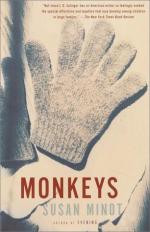|
This section contains 567 words (approx. 2 pages at 300 words per page) |

|
SOURCE: Moore, Charlotte. “Finding More Than Life.” Spectator 282, no. 8906 (17 April 1999): 41.
In the following mixed review, Moore praises the narrative significance of memory in Evening, but criticizes the novel's highly stylized prose.
[Evening] is a novel about the big issues: the point of life, the meaning of death, the power and fragility of memory. Susan Minot lays bare the inner workings, both physical and mental, of one unremarkable woman in order to ruminate on the mutability of the human condition and the elusiveness of our understanding of it.
Ann Lord is 65 and dying of cancer. She lies upstairs in her tastefully appointed house in Cambridge, Mass., drifting in and out of consciousness on waves of morphine; downstairs, her children prepare themselves for her death and unintentionally reveal how patchy their knowledge of their mother is. Slowly Ann Lord's thoughts and dreams cohere for the reader's benefit. Minot grants her...
|
This section contains 567 words (approx. 2 pages at 300 words per page) |

|


